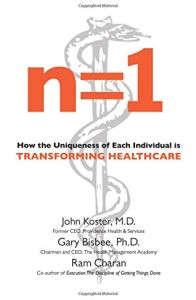Join getAbstract to access the summary!

Join getAbstract to access the summary!
John Koster, Gary Bisbee and Ram Charan
n=1
How the Uniqueness of Each Individual Is Transforming Healthcare
Prospecta Press, 2015
What's inside?
Health care leaders must question every aspect of their work to meet the demands of exacting consumers – their patients.
Recommendation
Health care is undergoing rapid internal and external change, thanks to digitization and “disruptive scientific innovation.” Struggling leaders can easily lose sight of the big picture of transformation. Health-system experts John Koster, MD, and Gary Bisbee, PhD, and leadership and change expert Ram Charan explain the needs of the unique, individual health care consumer – whom they call the “n = 1.” The health care industry’s ability to meet this aware customer’s discriminating demands will determine each provider’s success or failure. Health care leaders must question every aspect of their work to handle the coming challenges, so the authors provide strategic questions at the end of each chapter. getAbstract recommends their useful workbook to health care CEOs, strategists, physician groups and other “disrupters” in today’s medical fields.
Summary
About the Authors
John Koster, MD, is the former president of Providence Health & Services. Gary Bisbee Jr., PhD, leads The Health Management Academy. Ram Charan is an author and a business consultant who specializes in building organizations.































Comment on this summary